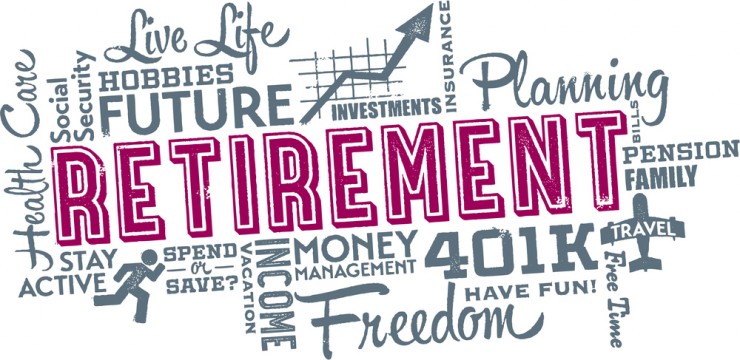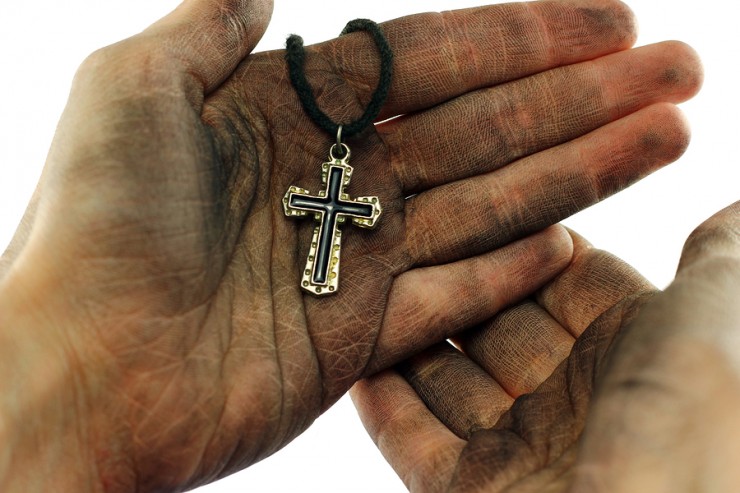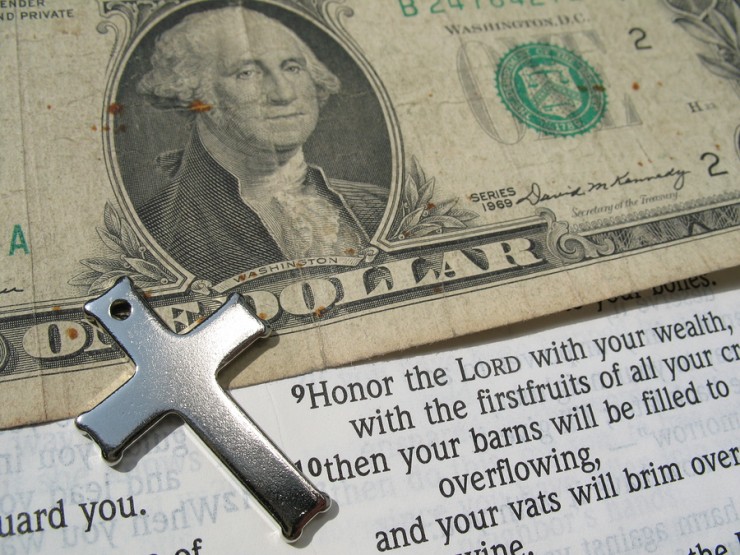Christian debt management is all about making changing in the present. In order to get out of debt major spending and behavioral changes must take place in your heart and mind. Every dollar you spend must be considered and accounted for in order to make a Christian debt relief program work. You may find your mind swirling with information and choices every day and all of these things are focused on right now, changing things right now in your financial life. While you are in the throes of this major life adjustment you will see commercials are hear people talking about “planning for the future.” These moments may have you thinking, “I’m just trying to survive right now! I can’t think about the future!” You may not realize it, but if you have sought out Christian debt help, you are securing your future in more ways than you might imagine.
Continue reading

If you are in the trenches of a Christian debt consolidation program, the last thing on your mind might be helping the needy in your community. You might very well be feeling as if you yourself are the needy one right now. However, the Christian obligation toward the needy is a relevant financial issue and as you continue your journey toward financial freedom you will have more disposable income with which to give. The question for many individuals is not should they give. Most Christians understand the giving principals and want to keep blessings flowing their way by giving to others. The question is to whom do we give? And how much of our own personal prejudice gets in the way of our giving to others?
Continue reading
We talk about money a lot around here. Like it or not, the way money is managed (or mismanaged) has a profound effect on just about every aspect of life, from relationships to physical, emotional and spiritual health.
But as we prepare to celebrate Easter, we are reminded of one gift that money could never buy.
More than 2,000 years ago, Jesus chose to leave his perfect home in heaven and become one of us. He could have entered the world as a king in a palace. Instead, he took the lowly position of a carpenter’s son, spending the first hours of His life in a feeding trough for animals. Continue reading
He is risen! – Matthew 28:6
Holy week is upon us and soon we’ll be celebrating the good news on Easter, that Christ is risen! If you’re like most Christians, you’ve spent the past six weeks of Lent reflecting on your life, your faith and your commitment to God and your church. It’s the season of spiritual rebirth, of cleansing and of hope. You can apply this feeling to most any aspect of your life, including your financial affairs. If you’re looking to rebuild and reinvigorate your finances, below are a few things you can do to easily enrich your financial health this Easter season.
1. Start or Add to an Emergency Fund
The last century has seen a decline in the overall character of man. On a national level the moral compass of our society has tilted far from “true north” so to speak. We see this through the lack of morality on television and in movies. We can see it through the increased crime rates in every city in America. We see it through an increase in crimes that in times past were absolutely unheard of.
We also see this decline in the financial world in the way businesses and government conduct their money as well as how individual’s view their own financial responsibilities. The decline in money morality has resulted in near catastrophic recession in the last decade which forced many Americans out of their homes and into foreclosure and bankruptcy. During that time period many people were comparing the events to those of the 1930s in which “The Great Depression” had a similar effect on American families. Continue reading
In our society there is often great confusion concerning wealth and increased income. One definition of wealth states that wealth is, “an abundance of valuable resources or material.” This could be pretty broad range of things. You may not have one dollar to your name, but if you had a chest full of rare diamonds, you could still consider yourself wealthy. So then, wealth can become subjective to whatever you may deem “valuable.” When an individual is in the trenches of a Christian debt consolidation program some days can seem dark indeed. The level of financial sacrifice you are making may seem unbearable some days. You may even experience some level of ridicule or judgment from people who do not understand what you are doing or why you are doing it. There may be days when you feel poor indeed. This is when you must reevaluate the true meaning of wealth.
Continue reading
I used to think only rich people could be obsessed with money. I saw how wrong I was when I began seeing signs money has become an idol in my own life.
I was actually more than $30,000 in debt when I was most obsessed with money. My intentions were good—I wanted to become debt-free. I wanted to protect my family by building an emergency savings. I wanted to give generously to my church. But I became so fixated with those goals that money turned into an idol, and I couldn’t even see it.
It was only through a loved one speaking into my life that I was able to wake up and realize I was on a slippery slope.
Read on for three signs money has become an idol in your own life…
Money is Constantly on Your Mind.
What do you think about when you first wake up? What’s on your mind just before you fall asleep? If your first and last thoughts of the day are centered on money—earning more, saving more, spending more or paying off more—it may be an idol. The Bible tells us we control our own thoughts, and we are to take every thought captive to make it obedient to Christ (2 Corinthians 10:5).
Keep an honest budget. Pay off your debt. Focus your attention on what matters.
Your Loved Ones Are Increasingly Frustrated With Your Money Talk.
Your family and close friends probably know you better than you think. If your spouse, children or friends look like they want to head for the hills when you bring up the subject of money (again), it may be an idol. Luke 6:45 says “the mouth speaks what the heart is full of” (NIV). A certain amount of money talk is healthy and necessary, but the subject shouldn’t come up every day. Don’t let an obsession with money damage or ruin a relationship.
You Have a “Destination” Mindset. Do The Following Thoughts Sound Familiar?
This type of “destination thinking” is a lie. Here’s the reality: if your joy rests in achieving a particular financial goal, you’ll be disappointed every time. It’s human nature. Once we complete one goal, it won’t be long until a new one pops up. Some people live their entire lives climbing a ladder to nowhere. Just check out Solomon’s experience with this subject in the book of Ecclesiastes. If this wealthy, powerful king couldn’t find satisfaction through money, no one can. Ask God to help you find true contentment in Him. Nothing else will fully satisfy.
Financial idolatry is real, and it’s alive and well in America today. But recognizing it in our lives is half the battle, as well as the first step towards rooting it out.
Remember the wise words of Matthew 6, and be careful where you keep your treasure.
Stockpile treasure in heaven, where it’s safe from moth and rust and burglars. It’s obvious, isn’t it? The place where your treasure is, is the place you will most want to be, and end up being (The Message).
Actually, more than $30,000 in debt when I was most obsessed with money. My intentions were good—I wanted to become debt-free. I wanted to protect my family by building an emergency savings. I wanted to give generously to my church. But I became so fixated with those goals that money turned into an idol, and I couldn’t even see it.
It was only through a loved one speaking into my life that I was able to wake up and realize I was on a slippery slope.
Read on for three signs money has become an idol in your own life…
Money is Constantly on Your Mind.
What do you think about when you first wake up? What’s on your mind just before you fall asleep? If your first and last thoughts of the day are centered on money—earning more, saving more, spending more or paying off more—these may be signs money has become an idol. The Bible tells us we control our own thoughts, and we are to take every thought captive to make it obedient to Christ (2 Corinthians 10:5).
Your Loved Ones Are Increasingly Frustrated With Your Money Talk.
Your family and close friends probably know you better than you think. If your spouse, children or friends look like they want to head for the hills when you bring up the subject of money (again), it may be an idol. Luke 6:45 says “the mouth speaks what the heart is full of” (NIV). A certain amount of money talk is healthy and necessary, but the subject shouldn’t come up every day. Don’t let an obsession with money damage or ruin a relationship.
You Have a “Destination” Mindset. Do The Following Thoughts Sound Familiar?
This type of “destination thinking” is a lie. Here’s the reality: if your joy rests in achieving a particular financial goal, you’ll be disappointed every time. It’s human nature. Once we complete one goal, it won’t be long until a new one pops up. Some people live their entire lives climbing a ladder to nowhere. Just check out Solomon’s experience with this subject in the book of Ecclesiastes. If this wealthy, powerful king couldn’t find satisfaction through money, no one can. Ask God to help you find true contentment in Him. Nothing else will fully satisfy.
Financial idolatry is real, and it’s alive and well in America today. But recognizing it in our lives is half the battle, as well as the first step towards rooting it out.
Remember the wise words of Matthew 6, and be careful where you keep your treasure.
Stockpile treasure in heaven, where it’s safe from moth and rust and burglars. It’s obvious, isn’t it? The place where your treasure is, is the place you will most want to be, and end up being (The Message).
As with many aspects of our financial lives and spending habits, most of our money choices are influenced by society. There are constantly underlying pressures on us to keep up with what everyone else is buying. The root of this pressure and our resulting obedience is pride. We do not want to seem strange, backwards or poverty stricken. This is very easily seen in the brand vs. no brand debate.
 Everything from cola to clothing is categorized into name brands and non-name brands. Making the choice between name brand and non-name brand is not as easy as just assuming that you should always buy the cheaper version, though. If you are reinventing your finances and trying to stick to a careful budget as part of your Christian debt relief program, you must consider that quality is an important factor when you are shopping. If you cheap out on a purchase only to find out later that the item was not of good quality, you will wind up spending even more money to replace it or repair it. So some thought and planning ahead come into play here. You can only control your finances when you plan ahead and spend thoughtfully.
Everything from cola to clothing is categorized into name brands and non-name brands. Making the choice between name brand and non-name brand is not as easy as just assuming that you should always buy the cheaper version, though. If you are reinventing your finances and trying to stick to a careful budget as part of your Christian debt relief program, you must consider that quality is an important factor when you are shopping. If you cheap out on a purchase only to find out later that the item was not of good quality, you will wind up spending even more money to replace it or repair it. So some thought and planning ahead come into play here. You can only control your finances when you plan ahead and spend thoughtfully.
Clothing
Clothing is a big consideration in the brand name debate. The issue of name brand clothing has a lot more to do with social status than it does with quality. People are proud of their labels. The best way to determine the wise choice as it pertains to clothing is to pinpoint your motives. Are you buying expensive jeans because you really, honestly know for a fact that these are quality jeans that will last a really long time, or are you just buying them because other people buy them and you want people to see the name on back? Your motives behind your spending are very important. Your spending motives can make or break your most carefully laid financial plans. The great thing about clothing is that if you shop thrift and consignment shops you can usually get name brands for a fraction of their regular price. Again, pride has to take a back seat to practicality, though.
Shoes
Shoes are one area in which you often find, especially if you have young, active children, that forking over the extra money for name brand shoes might be the better investment. Name brand shoes are generally made better and use longer lasting material, like real leather. Children beat up their shoes so badly, that often times buying shoes at thrift shops is not practical. By the time the shoes reach the Goodwill they are pretty much wasted. If spending an extra twenty dollars means the shoes will last an extra six to twelve months, then that is wise. Again watch your motives. Buy because of the quality, not because of the name.
Food
This is where most folks get tricked by the marketing villains. Off brand food is required by law to be of the same quality as name brand food. Therefore, you can’t argue that name brand is better quality. However, our subconscious will often play tricks on us and tell us that the name brand just tastes better. If there is a certain product that you just can’t stomach in an off brand that is understandable, however, do not go across the board and let your taste buds demand you buy name brand. Pick a few items each week to try in off brand. Within a month you will have changed your entire grocery list and will have begun to save quite a bit.
Other Stuff
When purchasing bigger items like electronics, appliances or furniture, take the time to research different name brands. Most importantly read reviews. Websites like Amazon will post honest reviews of almost every product they have listed. Even if you are not purchasing from the site, use the reviews listed under the product you are interested in to help you make your choice. Using sites like Consumer Reports can also help you understand the true quality of an item based on testing and consumer reviews. This is a great tool for larger purchases which you would consider an investment and you would like to see last for a good, long while.
Our lives are made up of important milestones like graduations, birthdays and anniversaries. Many people like to celebrate these milestones with parties and big events. These are a fun time for family and friends to get together, share memories and make new ones. For individuals who are currently involved with a Christian debt management program you may think that any fun events like these are off limits until you have reached your goals concerning your debt. It’s true that there is a lot of sacrifice involved in Christian debt relief. However, that does not mean you can never celebrate another big event with your family and friends.
Rethink Party
 You just need to rethink your definition of what a party or big event is. If in your past you could not have a party without expensive decorations and professionally catered food, then you must stop and re-evaluate. Most of these ideas are based on pride anyway. Many money troubles stem from a sense of pride and an un-Christ like desire to make people think highly of us. If you are throwing a party or hosting a big event for someone the event is not about you. It is about the person celebrating the milestone. Remember that your loved ones will be touched by your efforts not by how much you spend.
You just need to rethink your definition of what a party or big event is. If in your past you could not have a party without expensive decorations and professionally catered food, then you must stop and re-evaluate. Most of these ideas are based on pride anyway. Many money troubles stem from a sense of pride and an un-Christ like desire to make people think highly of us. If you are throwing a party or hosting a big event for someone the event is not about you. It is about the person celebrating the milestone. Remember that your loved ones will be touched by your efforts not by how much you spend.
Old Fashioned Pot Luck vs. Catering
Never underestimate the power of a good old fashioned pot luck style dinner. People get excited when they get to participate. A pot luck evens out the burden of providing food for your event in such a way that no one feels overwhelmed and in most cases each person will not spend more than they normally would on making a meal at home. A pot luck style meal is appropriate for a number of different events and are far more interesting as there will be a bigger variety of foods to choose from.
Bulk Tableware
If you are planning a large event visit a bulk supply store to purchase plates, napkins and flatware. You can get huge discounts when you buy large amounts of these products together.
Chill on the Decorations
There is no law requiring you to decorate every inch of every event. It is far more cost effective to decorate with something like photos of the folks you are honoring. Clothes lines strung with photos, or individual notes written to the special someone are a touching way to decorate your event space. These can be organized and gathered together weeks ahead of time. Another great alternative to excessive decorations would be to organize a slide show of photographs celebrating the life of the individual. When set to appropriate music these are usually an emotional addition to any celebration and in most cases the decorations or lack of decorations will be forgotten about as every one reminisces together in this special way.
Research Freebie Venues
There are many organizations which will allow the use of their facilities by the community for free as long as you agree to care for and clean the area during and after your event. Community centers, schools and churches are a great place to start looking for free venue options.
Choose Emotion Over Expensive
Taking the time to make the event emotional and memorable will create a far greater and longer lasting effect on those present than expensive food and decorations. Remember that these celebrations are about people not hundred dollar shrimp platters.
Christian debt relief programs are built upon the concept of creating a plan and sticking to that plan no matter what. When you have a financial plan and stick to it like glue, there are few money obstacles that you can’t successfully tackle. Most people find themselves in a debt disaster seeking Christian debt help because they did not have a plan in the beginning. Each area of our lives will require its own individual financial plan. Near the very top of our list of financial priorities should definitely be our homes.
Why Plan?
Our homes are our most important investment. Shelter is one of our top legitimate needs which income must be allocated for. But even with this most necessary of human needs, there are different ways this need can be met. Once you have invested in purchasing a home you want that home to continue to meet your needs for as long as possible. This can only happen if you have a plan concerning home maintenance.
Expect the Worst
One of the great fallacies of money management is to wait until something goes wrong to decide how to pay for it. Go ahead and accept the fact that things will go wrong with your home. At any given time there are a number of things that can go wrong. Appliances, plumbing, electrical, HVAC, pest infestations and general wear and tear all add up to big money over the years. Many of these issues can be handled with money from a carefully maintained emergency fund. When you think of how essential to our daily life and comfort something like hot water is, you can understand how important it is to be able to go purchase a new hot water heater the day you need it. An emergency fund makes this possible.
Common Sense Saves You Money
Some of the home maintenance issues that you will face are simply the result of time and cannot be helped. However there are also a myriad of home maintenance problems that would not be problems if a little forethought was used. There are some steps you can take to save yourself a lot of trouble and money in the future.









